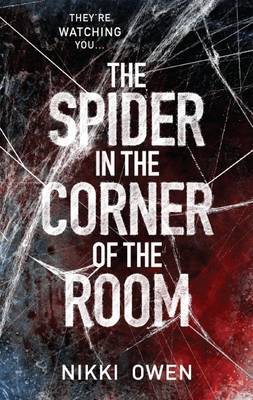'"The Spider in the Corner" Nikki Owen

Synopsis:
Plastic surgeon Dr Maria Martinez has Asperger’s. Convicted of killing a priest, she is alone, in prison and has no memory of the murder. DNA evidence places Maria at the scene of the crime, yet she claims she’s innocent. Then she starts to remember… A strange room. Strange people. Being watched. As Maria gets closer to the truth she is drawn into a web of international intrigue and must fight not only to clear her name but to remain alive.
To me, I found this book was a real mix of genres. There's conspiracy, mystery, murder, mental illness. The ambitious combination of all these different themes is really well handled by Owen, making it a highly original and fresh voice in the world of crime fiction.
Maria Martinez is a plastic surgeon who has Aspergers. The book opens with her already in prison, convicted of a killing a Catholic Priest, Father Reznik. She has no memory of this and is certain she is innocent. I found this a truly intriguing opening - starting off with your protagonist already in prison is a really clever idea and within the first page the link between crime, murder, religion and Aspergers are already filling the reader's mind with a multitude of questions and curiosity about the characters, set up and plot.
Martinez is struggling in prison. Lonely, isolated, confused and unable to cope without her fixed routine, her vulnerability is further exposed with the invasive prison procedures and constant intrusion of any personal space. The conversations and interviews between her and the police, prison officials, other inmates and her therapist are fascinating and depict her intelligence and emotional state with real conviction. She retains every detail, she collects data obsessively. Her social interaction with her peer group is so awkward - her responses and reactions so different from the other prisoners- it could almost humorous at times, but without a doubt, it creates substantial tension.
Martinez is also struggling as she tries to piece together what has happened to her. With the help of the arrival of a new cell mate Patricia, Martinez begins to establish a relationship and a routine. She has found someone in whom she can confide and talk to. "I have learnt not to put my faith in anyone, not to trust, because no one, not a man in a priest's outfit, not a judge in a robe, not a God in the sky can be relied upon. But Patricia seems different, pure, a white sheet of cotton, a dandelion in the wind. She believes me." Martinez knows that Reznik taught her how to detect patterns and codes and trained her to fix things fast. He frequently tested her with advanced mathematical challenges and now she realises it must have all been for a reason. She just needs to find out what the reason was. Fixated with the idea of everything having a purpose, she now seeks the purpose of Reznik's "training" and the way she can recall data she doesn't even remember learning.
It's hard to say much more without revealing too much about the book. I found Martinez an interesting creation. She is definitely the main character but at times I found it a little hard to build a deep relationship with her. I wonder if this is because Owen has depicted someone with Asperges with such authenticity, that actually part of this has to be that there is a distance or boundary around them reflecting their social awkwardness or preference for remaining slightly more removed from others. Despite this, she is a compelling character who is consistently convincing and authentic.
Martinez frequently asks questions and there are several paragraphs which contain many questions as she mulls over events, memories and conversations. This is effective in several ways; it creates tension and suspense, mimics Martinez's thought process and encourages the reader to relate to her confusion and panic. At times I did find it a little overwhelming but appreciate this was probably the author's intention! It's also important as Martinez's memories are called into question. Kurt challenges her saying "perhaps your memory is not what you believe it to be....is your memory reliable?" Later Dr Andersson says that she finds her version of events hard to believe, she suspects Maria of making things up, of "mis-recollecting" things. So not only is Martinez trying to operate in a world with which she already feels detached from, where she already struggles to make herself understood, now no one will believe her. This also challenges the reader to consider how reliable she is as a narrator and whether we can actually believe her and what she claims to be remembering- an incredibly effective device in a novel about conspiracy!
I thought the character of Kurt, the therapist, was also very well crafted. From the outset I was unsure how to respond to him as often his questioning or counselling was quite blunt, more direct and more confrontational than he perhaps needed to be. I was constantly wondering whether to trust him, whose side he was on and what his motives were. Trust and distrust are important themes in the novel and Owen also uses this concept to explore the fragility and vulnerability of people while in prison or within the judicial system. Her ability to control these themes, complex characterisation and also maintain a plot of murder, mystery, memory and conspiracy shows her to be an accomplished writer.
This is a good read. It certainly feels similar to series like "The Bourne Identity" and Stieg Larsson. It also reminded me a little of some of the more recent TV series like "Marcella" and "The Bridge". It's full of pace, the chapters are often quite short and it's very readable. If you like conspiracy thrillers and slightly unconventional characters then this book is definitely for you.
For more recommendations and reviews please follow me on Twitter @katherinesunde3 (bibliomaniacUK)
Comments
Post a Comment